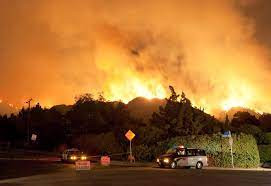
When burdened by the tangible angst and unease around the future of our planet, a term like “climate anxiety” can seem insufficient. It can feel paltry and shallow, implying we are fretting or fussing over an imagined future. In reality, seeing the mounting global disasters and learning of evidence-based projections of our changing world comes with a heavy emotional gravity. For some, “anxiety” simply doesn’t do it justice. For people like Freed—and myself, and potentially you, reading this now—the phrase “climate dread,” better than “climate anxiety,” legitimizes the real and tangible threat coming toward us and communicates that fear to others.
The importance of this distinction is not just etymological. The emotion of dread affects us differently from anxiety. Understanding how can provide insight into our reactions to climate change, and why it can be so hard to spur people to climate action.F
(From "Stop Calling It 'Climate Anxiety.' Call It Climate Dread," by today's guest, Hannah Seo, in The New Republic, August 28.)
Seo is a science, health, and environmental journalist based in Brooklyn, NY. Her work has appeared in The New York Times, Scientific American, and The Guardian, among others.
- KBOO


